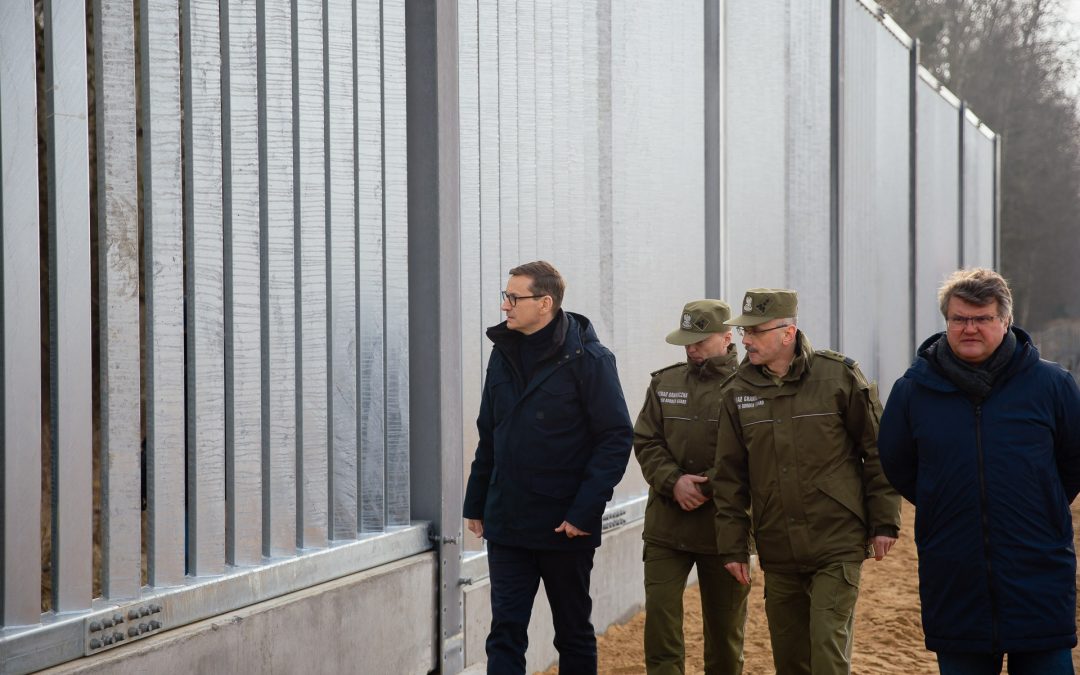The Polish government has announced that it will remove the exclusion zone on the Belarus border from 1 July. Since September last year, all non-residents – including journalists and humanitarian groups – have been banned from freely entering the area due to to an unprecedented surge in attempted crossings.
In an official explanation, the interior ministry stated that there is no “necessity to extend the ban” – which was last prolonged in February – due to work on a new border wall being almost complete.
Yesterday, the Polish border guard’s spokesman, Anna Michalska, told the Polish press Agency (PAP) that the 187-kilometre wall, construction of which began in January, would be finished “as planned by the end of June”. After the physical barriers are complete, work will begin on electronic elements of the wall.
#bariera🇵🇱🇧🇾
Pierwsze ukończone odcinki bariery na granicy🇵🇱🇧🇾zostały odebrane. Trwają odbiory pozostałych. Przęsła ustawione są już na długości 140 km. W najbliższych dniach rozpocznie się instalacja bariery elektronicznej 💪#bezpieczeństwo #bezpieczna🇵🇱Odcinek #PSGKuźnica👇 pic.twitter.com/NTFelTcjHz
— Straż Graniczna (@Straz_Graniczna) June 12, 2022
Last year, as tens of thousands of people – mainly from the Middle East, Africa and Asia – tried to cross into Poland from Belarus, the government initially announced a state of emergency at the border that banned entry for non-residents. When that expired, it was replaced by newly introduced legislation to the same effect.
Last week, the interior minister, Mariusz Kamiński, announced that “on 1 July the ordinance on a temporary ban on entering 183 municipalities on the border area in Podlaskie and Lublin provinces will expire”.
According to a further statement by the ministry, the only restriction that will remain in place – initially for 30 days – is a ban on entering an area within 200 meters of the border in Podlaskie province, due to the ongoing “installation of electronic elements of the wall”.
The government last year pledged to create an “impenetrable” wall, equipped with motion sensors and a monitoring system. The total estimated cost of the project is 1.6 billion zloty (€348 million).
Without the wall in place, “hundreds of thousands of migrants would pass through” the unprotected border, warned Prime Minister Mateusz Morawiecki earlier this year. Hundreds of scientists, however, have signed a letter warning that the construction will have a “devastating” effect on the environment.
On 9 June, the border guard noted that it had recorded almost 5,500 attempts to illegally cross into Poland from Belarus so far this year. Those figures are much lower than in 2021, when 17,500 such attempts were recorded in October alone at the peak of the crisis.
Main image credit: Krystian Maj/KPRM (under CC BY 3.0 PL)

Agnieszka Wądołowska is deputy editor-in-chief of Notes from Poland. She is a member of the European Press Prize’s preparatory committee. She was 2022 Fellow at the Entrepreneurial Journalism Creators Program at City University of New York. In 2024, she graduated from the Advanced Leadership Programme for Top Talents at the Center for Leadership. She has previously contributed to Gazeta Wyborcza, Wysokie Obcasy and Duży Format.




















